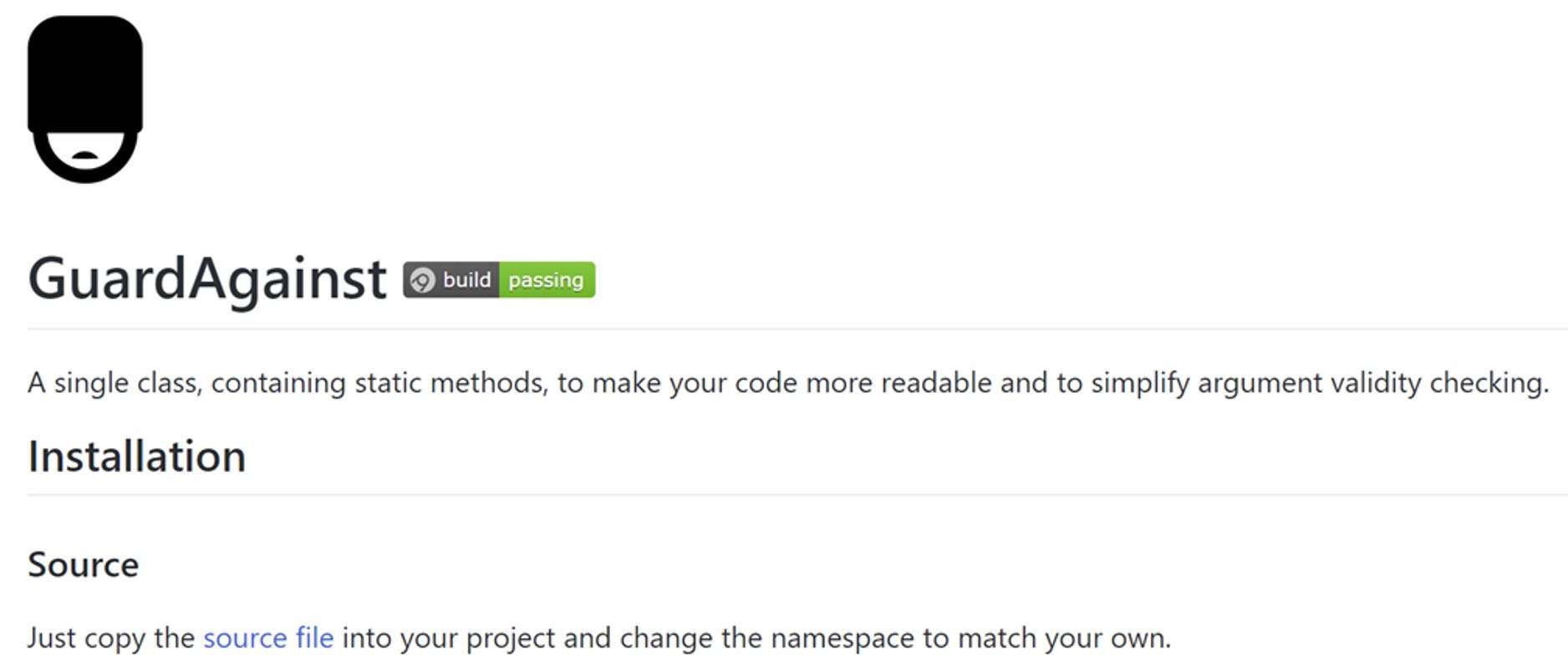I like C#. I can remember downloading the first beta and playing with C# for the first time and thinking it was a lot like Java, which made it instantly familiar to me. C# 8.0 is due soon. We don’t know when, Microsoft hasn’t officially announced a date yet. But if we go by the release dates of the previous major versions we could expect C# 8.0 to drop sometime in 2019.
Microsoft now develops all the things in the open and so detailed design specs for each of the proposed new features for C# 8.0 can be found on GitHub. There are several often blogged about headline features such as: nullable reference types, async streams and extension everything. In this post though I want to focus on one of the more low key features, the CallerArgumentExpression Attribute and how it could greatly simplify one of my open source projects, GuardAgainst.
GuardAgainst
So let me tell you about a small, unambitious project I have on GitHub called GuardAgainst. It’s a library to make writing guard clauses for your methods trivial.

Methods are contracts. They accept arguments, do stuff with them and potentially return a value. If a method cannot meet the contract based on the given arguments it should throw an appropriate exception.
Writing these guard clauses, that throw if arguments are not valid, is tedious work and introduces noise and clutter to the code. The goal of GuardAgainst is to make writing these guard clauses concise and expressive. Consider the following simplistic example of a method that accepts two strings and concatenates them together.
| |
First we check that each argument is not null. If it is we throw an ArgumentNullException exception. If not we then check that it’s not just whitespace and if it is we throw an ArgumentException. This is because ArgumentNullException and ArgumentException convey different meanings and we want to be as precise as possible about why the argument does not meet the method contract. So we end up with four guard clauses. Two for each of our arguments. A developer reading this code has to mentally parse each clause and move on until they get to the actual meat of the method.
GuardAgainst provides a bunch of methods to reduce this code into much neater calls that are named carefully to be very readable and clearly express their intent. So the code in the above example would become this…
| |
There are many such libraries available but I felt the need to create another one as they often suffer from usability issues (bad naming, clunky methods), performance issues (reflection, boxing) or simply don’t have the range of features to check the conditions I wanted to be able to guard against. I also designed it as a single file that could be dropped into a project so that consumers do not have to take a dependency on a dll or a nuget package.
Even though I’ve tried to keep the usage of this library as simple as possible. The new CallerArgumentExpression could dramatically simplify things even further. Let’s first look at how I implement a typical method in the library.
How GuardAgainst currently works
Here is a simplified example of what a typical guard method in the library looks like and how it’s called.
| |
| |
In this example we are guarding against an argument being null so we pass the value that we want to check: firstname. If argumentValue isn’t null then we just return. If it is null then we throw an ArgumentNullException. Pretty simple.
The Problem
In order to make this useful we also need to pass in the name of the argument to the constructor of the exception. If we have several parameters then having the name in the exception makes it obvious which parameter caused the fault. The problem is that there is no way to get this name unless the caller of the method passes it in for us.
I’ve never liked this. It’s a clunky necessity that adds friction to the api. The ultimate goal is to be able to know the name of argument being passed in without the developer having to actually pass it in via another argument.
A Possible Approach
One possible way I could achieve this goal right now with current C# is by making ArgumentBeingNull accept an Expression<Func<T>> and have the caller pass in an expression that evaluates to the thing to be checked for null. I’d also then be able to get the string representation of that argument too. Sounds good, let’s have a look.
| |
| |
I’ve not yet added this to the GuardAgainst library as there are a couple of things I’m not overly happy about. The first is performance. This is not a huge issue based on some crude tests but it’s significant enough to give me pause.
The second and main reason I’ve not done this is I think forcing people to write an expression like () => firstname is just as weird and awkward as making them pass in the name of the argument. Clunky weirdness is what I’m trying to avoid.
The ultimate goal is to be able to know the name of argument being passed in without the developer having to actually pass it in via another argument.
CallerArgumentExpression to the rescue
The new CallerArgumentExpression attribute proposed for C# 8.0 would be a great solution to this problem. Now consider the following code which is identical to my initial ArgumentBeingNull example above except that I’ve added the CallerArgumentExpression attribute to the argumentName parameter.
The compiler recognises the CallerArgumentExpression attribute and uses the string passed to its constructor (i.e. argumentValue) to target that parameter and converts the incoming expression to a string which is assigned to the argumentName parameter.
| |
What a developer would write to call it …
| |
What the compiler effectively emits…
| |
“Allows developers to capture the expressions passed to a method, to enable better error messages in diagnostic/testing APIs and reduce keystrokes.”
The CallerArgumentExpression attribute is effectively giving me the Expression<Func<T>> solution I was toying with but without the performance overhead and without the clunky () => firstname syntax.
Not only would this be a super easy code change for me to implement, I would just need to add the CallerArgumentExpression attribute and I’m done. It would also mean that callers of the library would just pass in the value of the argument they wish to guard against being null as they’ve always done but they would no longer have to explicitly specify the name. Ultimate goal achieved!
